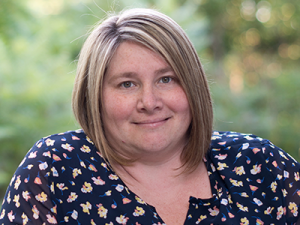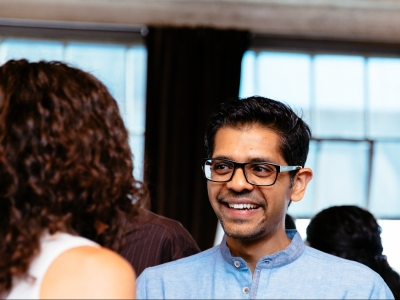Amanda Mayer has been Program Director and Chief Operating Officer at the Lawson Foundation since 2014. She’s an alumna of Carleton University’s Master in Philanthropy and Nonprofit Leadership program — and is cause-driven, engaged, and socially conscious. She’s also the co-Founder of MESH, a network for young, nonprofit professionals in Ottawa-Gatineau.
![]() How has COVID-19 impacted the work of your organization?
How has COVID-19 impacted the work of your organization?

COVID-19 has had a negative impact on the Foundation’s financial returns from investments, although we’ve rebounded somewhat since March 2020. The transition to a 100% remote work environment, including staff working at home, was smooth because we’d already had the flexibility to work remotely. The pandemic also re-focused our funding efforts: we launched a phased, funding package that focuses on emergency response and that supports organizations in our strategic sectors, including in Indigenous communities. Phase 1, now complete, supported rapid-response initiatives related to the pandemic. Phase 2 supports critical infrastructure organizations and is still in the works. Phase 3, supporting Indigenous communities, is also taking shape as we work alongside Indigenous partners.
![]()
What are the steps your organization is taking to adapt to the COVID-19 crisis?
Steps initially included: (1) lifting restrictions on existing grants, so grantees could deal with urgent issues; (2) suspending reporting requirements; and (3) continuing to flow grant payments, and in some instances, providing advanced grant payments. The Foundation hasn’t pulled back on its grantmaking and will continue to give more than 5% of endowed assets annually.
![]() Which changes or insights do you think are here to stay?
Which changes or insights do you think are here to stay?
The need to learn quickly to use virtual platforms and create internal systems (training, security, etc.) may permanently change the way organizations work. More broadly, the challenge of physical distancing due to COVID-19 reveals the systemic inequalities in our society. It highlights who has financial security and who doesn’t, and who has broadband access and who doesn’t, and a hundred other inequalities, big and small. It emphasizes how important it is to support social infrastructure — all the ways that we connect, whether we’re family, friends, colleagues or strangers — and to check in on one another and help each other, especially the most marginalized among us.
![]() How could sector leaders help?
How could sector leaders help?
Sector leaders should be prepared for a huge, economic fallout and a corresponding increase in government debt. The charitable sector is going to be both more strained and more relevant. Philanthropy will never replace government, nor should it. Yet this is the time for philanthropy to increase charitable giving — to address people’s direct needs and to support social infrastructure. Foundations should be prepared to give at least 5%, and hopefully more, both in response to COVID-19 and after it passes.



